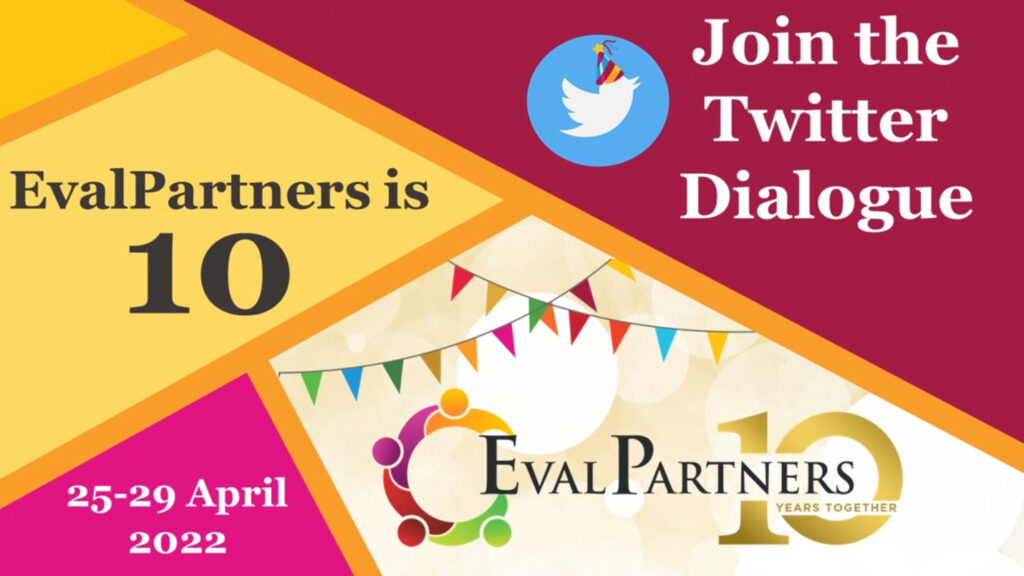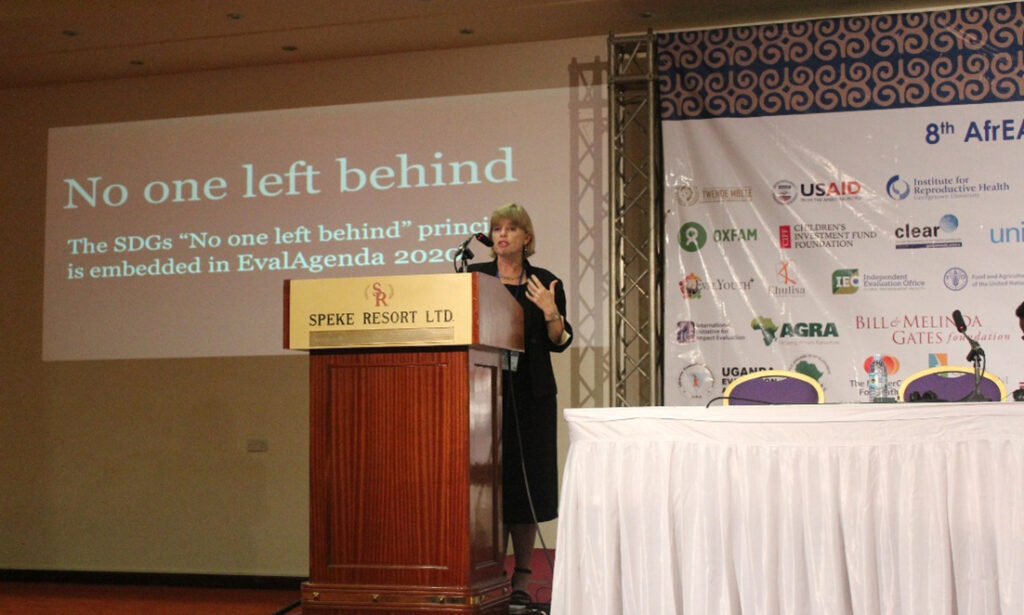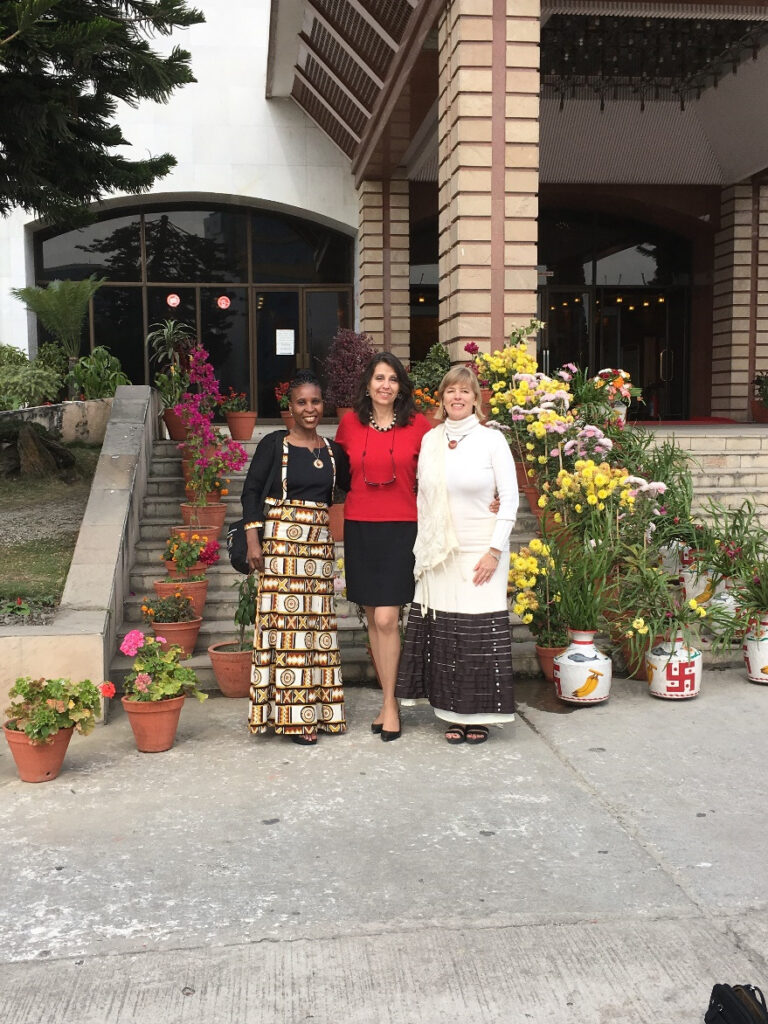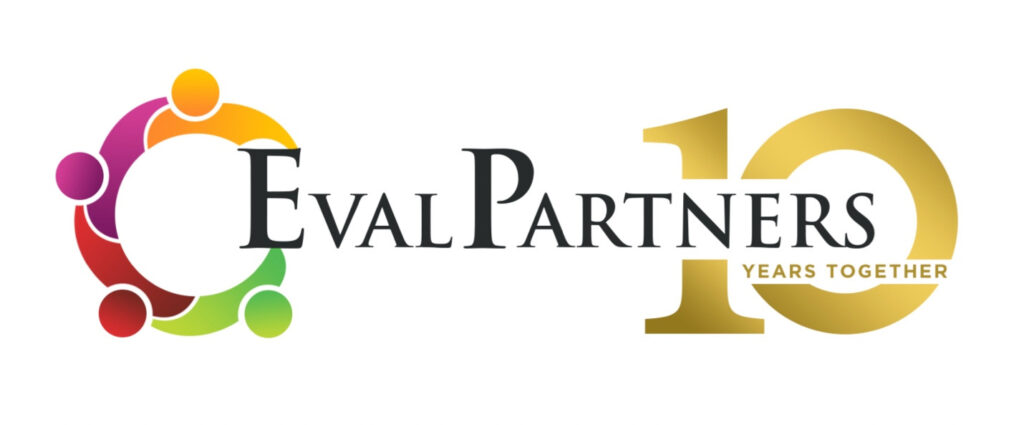EvalPartners, an innovative global movement advocating for the role of evaluation in every important decision, turns ten years old in April 2022. To recognize and celebrate this milestone, EvalPartners is hosting a “10 Years Together Twitter Dialogue” from April 25-29. Khulisa is excited to participate in this dialogue and we hope you are, too.

EvalPartners has achieved several important goals over the past decade, including establishing five influential “EvalNetworks” (EvalGender+, EvalYouth, EvalIndigenous, EVALSDGs, and the Global Parliamentarian Forum for Evaluation), and successfully advocating for the United Nations to declare 2015 “the International Year of Evaluation”.
EvalPartners was born in April 2012 during a Board meeting of the International Organization of Cooperation in Evaluation (IOCE) in Accra, Ghana, and Khulisa has been involved with EvalPartners from the beginning. Jennifer Bisgard, one of Khulisa’s founders and its current Director of New Initiatives, was at that 2012 meeting in Accra and eventually joined the EvalPartners management group, representing the African Evaluation Association.
We sat down with Jennifer to talk about her memories and thoughts about EvalPartners, in the context of the three questions we’ll be discussing in this week’s Twitter Dialogue.

Jennifer Bisgard speaking about EvalAgenda at the Closing Ceremony of the African Evaluation Association (AfrEA) 2017 Conference in Uganda
Question 1: What is your favorite EvalPartners memory or milestone?
Jennifer:
EvalPartners was initiated by the International Organization for Cooperation in Evaluation (IOCE) and U.N. agencies in 2012, at the African Evaluation Association (AfrEA) conference in Ghana. At that same conference, I was elected to represent southern Africa on the AfrEA board.
By 2013, I was also representing AfrEA on the IOCE board, which meant I was also serving on the EvalPartners Management group. Our role was to support and develop EvalPartners. One of our main accomplishments was having 2015 declared the International Year of Evaluation by the United Nations General Assembly. We launched the effort in 2013, at the Third International Conference on National Evaluation Capacities organized in São Paulo, Brazil. Over the next two years we managed to get evaluation associations, governments, NGOs and others to sign and endorse the resolution. This effort raised evaluation profile across the world.
EvalPartners also came up with the concept of an “evaluation torch”. During the signing ceremony, the “torch” was lit whatever was culturally appropriate…We lit a candle here in South Africa.
In 2015, during the International Year of Evaluation, EvalPartner members and management group met in Nepal, to work on the EvalAgenda. I along with other EvalPartner management members played a role in launching the EvalPartner networks which included: EvalYouth, EvalSDGs, EvalIndigenous, EvalGender and EvalParliamentarians.
And we had the EvalYouth – we’d managed to fundraise to get young evaluators from around the globe to come – and each one was given a card with an SDG. They stood in front and there is this lovely photo of all of them. We were all told to wear our national costumes — I wore a Xhosa dress!

Question 2: What are your hopes for our EvalFuture and a renewed EvalAgenda? What are the key issues that should be raised in the EvalAgenda?
Jennifer: I would really like EvalPartners to create an Evaluation Atlas on countries and regions. There are metrics which should be measured consistently (i.e. freedom to evaluate without fear of being persecuted, likelihood of evaluation reports being published, existence of an evaluation association, etc.). In the journalism world, you have these indices like the “world press freedom index” …I’d love to see a similar way to measure evaluation freedom because if you don’t measure it and it doesn’t become news, then it’s not a pressure point. What do we do for evaluators in Ukraine, Russia, or Egypt, or Turkey? These indices could be a really interesting pressure point.
Question 3: How can the global evaluation community better promote Country-led Evaluation of the SDGs?
Jennifer: I would like to widen the evaluation community to include government programmatic auditors based in Auditor/Inspector General offices around the world. Their job is to assess if government programs are achieving their outcomes and they actually conduct program evaluations. However, they don’t consider themselves evaluators.
Since evaluation is about:
· accountability
· compliance.
· build knowledge, and
· learning – how do you adapt your program to make it better or more effective?
All those are firmly the roles of inspector generals, auditor generals, and their offices around the world. They need to be brought into our @EvalPartners fold and convinced that they’re also evaluators.
We need to bring them in, and help assign the evaluation of the SDGs to those offices. Every government has an inspector general or auditor general, so assigning it to somebody, rather than leaving it as this amorphous thing – who’s going to DO the country-led evaluations of the SDGs – would really help.
For more stories and thoughts about EvalPartners and our 10 years together, or to join in the discussion yourself, follow @EvalPartners on Twitter from April 25-29.
